
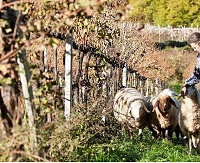 |
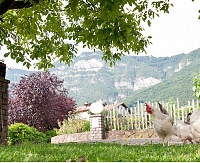 |
When I drove up to the Tröpfltalhof, Andreas Dichristin already met me on the road. Not to greet me, though, but to look for his sheep, who were apparently curious to see how the grass tastes at the neighbour's farm. And that - with the sheep - brings us straight to the topic that determines life and work on the Tröpftalhof: biodynamics, in which the sheep also play an important role. Andreas Dichristin was for a long time one of the leading heads of the Solos Group, the biodynamic project of the Kaltern Winery, and is certainly one of the South Tyrolean winemakers with the most experience in this field. A walk with him through vineyards is at the same time an easy-to-understand introductory course in the principles of biodynamic viticulture.
"The conversion to biodynamics" says Andreas Dichristin "happens above all in the mind. You have to get away from working against something and instead work for something. Above all for a healthy, vital soil, because it is the foundation and the plant is only a reflection of the soil. If everything fits there, then everything doesn't work by itself at the top, but it is much easier. And there is no need - for the most part at least - to fight against diseases and fungal infestations." As an example, Andreas Dichristin showed me his ten-year-old Sauvignon vines, which "have never seen a pesticide - not even an organic one. Only teas, biodynamic preparations and homeopathy have been used here from the outside." Andreas Dichristin also avoids copper as far as possible and uses sulphur and clay instead, although only the former has a fungicidal effect. "But the clay, together with the vital soil, ensures that I can do without copper in 90% of critical cases. In the end, it is always important to promote the harmony of everything and to ensure that every phase of the plant's development is fully completed. If there is disharmony, the plant suffers from deficiency and reacts to this with increased susceptibility to disease and with exaggerated growth at a time when the transition to the ripening phase is actually already imminent. The result is often inharmonious, alcoholic wines." Also contributing to the harmony of the overall system are the crops standing between the rows of vines, which ensure that the wine is not a monoculture, but an integrated part of the overall system. Which brings us to the sheep. They too play their part. "Apart from the fact that their excreta provide valuable fertiliser for building humus, they bring a valuable soul component to the vineyards with their energy. Animals are simply closer to nature and that has a positive effect on the whole."
The cellar is also characterised by natural materials, first and foremost clay. There are also a few wooden barrels and hardly any steel containers. The latter are only used for short interim storage when the wines are moved "I mainly use clay because clay is the balancing factor in the soil between growth and maturity. It also has this harmonising effect during the ageing of the wine in the cellar. Moreover, the amphorae have no taste influence on the wine as well as an aesthetically beautiful shape." Aesthetically beautiful are also the flats in which one can rent at the Tröpftalhof. All of them were renovated exclusively with biologically safe materials, offer plenty of space and, with their large balconies, a magnificent view in all directions - but no wireless internet access. This was dispensed with in favour of freedom from radiation. However, if you have your laptop with you, you can connect it with a cable.
Garnellenweg 17
39052 Caldaro
Tel/Fax: 0039/0471/964126
info@bioweinhof.it
www.bioweinhof.it
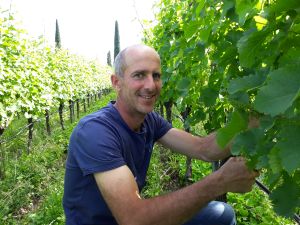 |
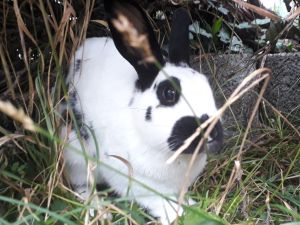 |
As soon as you enter the small estate, you sense how we live and work here: with nature and for it. Fragrant lavender and lush vegetation that the wild bees enjoy; a colourful sea of blossoms between the rows of vines and, last but not least, two lively stable rabbits that enjoy their lives outside the stable in a spacious enclosure and are not destined for the cooking pot like most of their kind, but simply enrich life on the farm with their presence. Encouraging all that is alive in everything they do is what matters to Werner Seppi and his family.
As an independent winery, the farm has not existed for long. The first of their own wines was bottled in 2017. Werner Seppi himself, however, is already something of an 'old hand', especially when it comes to biodynamic viticulture. He has been cultivating his vineyard according to biodynamic methods since 2005 and was one of the founding members of the 'Solos' group of the Kaltern Winery. "As much as I identified with the Solos project, at some point I simply wanted to know how the wine from my own grapes tastes and no longer deliver them to the winery, even if it does exemplary work in terms of quality and bio-dynamics.
And the experience I have gained in a good ten years at the Solos Group is a treasure for which I will be grateful all my life," says Werner Seppi. Five wines are produced. The South Tyrolean classics Pinot Blanc, Sauvignon Blanc, Gewürztraminer and Kalterersee as well as a single-varietal Cabernet Franc. Werner Seppi's credo for all wines is: "Harvest fully ripe grapes and leave the wines alone as much as possible in the winery. What is important in the vineyard as well as in the cellar is an ambience that is good for the wines. I want round, harmonious wines with a fine, mineral note that gives them the typical South Tyrolean character, where you can feel both the warmth of the south and alpine freshness. All wines are matured by me in wooden barrels.
Not to steer the taste in a certain direction, but because the wood creates a natural ambience for the wines to develop." With his first vintage, the 2016, he has already succeeded very well. The Seppi wines are fine, self-contained growths with depth that gives them good ageing potential and a complexity where there is something new to discover with every sip.
Prey Street 18 A
39052 Kaltern, Italy
Tel: +39 335 538 39 10
info@seppi.wine
www.seppi.wine
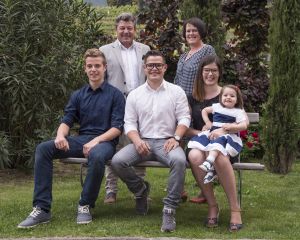 |
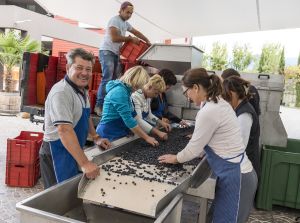 |
Oskar Andergassen and his son Hannes are very individual winemakers. They have clear ideas about how their Klosterhof wines should be, namely distinctive in terms of the characteristics of the respective variety as well as intense and multi-layered, not to be confused with powerful heaviness. "That doesn't suit our varieties at all, with the exception of Merlot perhaps," says Hannes Andergassen. Here, even the wines that are otherwise readily vinified for early enjoyment in the spring after the harvest - such as Vernatsch for Lake Kaltern and the white wines Weißburgunder (Pinot Blanc) and Goldmuskateller (Gold Muscat) - are treated in such a way that they need a certain amount of maturity to develop their qualities. Five varieties are grown - Pinot Blanc, Gold Muscat, Vernatsch, Pinot Noir and Merlot. Even though all wines are treated with the same care in the vineyard and in the cellar, Pinot Noir is the Andergassens' 'favourite child'. "On the one hand, of course, because it is the highest-quality variety, but also because it is - next to Vernatsch - certainly the most difficult. And the difficult things are just particularly appealing," says Hannes Andergassen. The Pinot Noir vineyards are located on the east side of the estate, where it is not so hot due to the downward winds from the Mendelgebirge. In suitable years, a Riserva version is produced, selected from choice clones of the estate's oldest vines. In 2017, the 2014 vintage won first prize at the international Pinot Noir competition in Montan. The rosé 'Summer' is made from the grapes of the young Pinot Noir vines. Here, too, the emphasis is on character and the grapes are left to ferment with the must for a relatively long time - up to 36 hours.
The Klassischer Kalterersee is made exclusively from grapes from the 'Plantaditsch' vineyard. It is produced very elaborately. The grapes are harvested relatively late, between the end of September and the beginning of October. Afterwards, the grapes are separated from the stems and are then placed on a shaking table, where the berries are again selected by hand. Fermentation and ageing take place 50% in wood and 50% in steel tanks. The goal is a demanding Kalterersee, which at the same time has the typical characteristics of this wine - suppleness and drinkability. The Andergassens also age the two white wines in wood. This is not so unusual with the Pinot Blanc, but it is with the Goldmuskateller, because this aromatic variety is otherwise usually vinified as an uncomplicated aperitif wine with a noticeable residual sweetness. With the Andergassens, however, it is completely dry. Through maturation in wooden barrels and partial maceration, it loses its extreme aroma and thus achieves a balance of taste even as a dry wine. The Pinot Blanc is matured in acacia wood barrels from our own forests in Montiggl. The acacia wood, which is felled during the full moon, has the advantage that it gives the wine a certain structure, but is neutral in taste and thus does not mask the fine aromatics of the variety. A Riserva version of Pinot Blanc is also produced in suitable years. With Merlot, the focus is on fullness, power and concentration. Therefore, the grapes are harvested late - in the middle/end of October - and 10% of the harvest is air-dried for three weeks.
No chemicals are used in the vineyard. The contact agents copper and sulphur are used against fungal infestation, the spontaneous vegetation is controlled mechanically and fertiliser is applied - if at all - with manure. In addition, great importance is attached to good soil care with sowing and well thought-out mechanical cultivation. Their own distilling licence enables the Andergassens to offer two types of grappa made from Pinot Noir and Gold Muscat as well as two fruit brandies made from apricot and Williams pear.
Four double rooms, a suite and a holiday flat are available for holiday guests.
Tasting and sales are possible during guided farm tours from April to early November on Tuesdays at 6 pm. Registration until Monday evening. For small groups min. 6 to 20 persons, also on request.
Klavenz 40
39052 Kaltern on the lake
Tel: +39 0471 961046
www.klosterhof.it
www.weingut-klosterhof.it
info@klosterhof.it
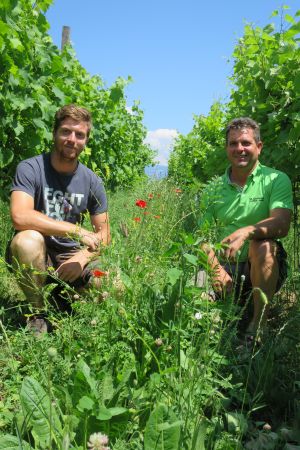 |
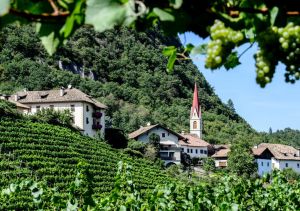 |
"Good wine grows here". This simple sentence is proudly and confidently written on the homepage of the online presence of the St. Quirinus winery in the Oberplanitzing district of Caldaro. I had already tasted some of the winery's wines before my first visit and appreciated their taste qualities very much. During my visit, the longer I stayed, the more I was taken with how the wine grows here and what kind of wines they are, namely biodynamically produced growths, many of which are vinified from fungus-resistant varieties. The former - biodynamic - is fortunately not quite so rare in South Tyrol these days, the PIWIs still are - especially in this quality. The self-confidence expressed in the opening statement also characterises Robert Sinn and his son Michael, who are both responsible for the wines and the decisions regarding biodynamics and variety selection. Both Robert and Michael Sinn are characterised by a pleasant calm and composure. Here they simply do what they think is right, they do it well and, above all, they do it with a lot of pleasure.
The winery, which is located in an ancient wine-growing area, is still very young. In the past, the vineyards were cultivated by one of the most important monasteries in Bavarian history, the Tegernsee Monastery. The vineyards in Oberplanitzing, which was once called 'Planties superior', supplied the wine that the Benedictines needed for themselves and the many high-ranking visitors. The old field name 'Planties' is also used for Robert and Michael Sinn's most successful wines at present: the 'Planties Amphora' vinified in the clay amphora, the 'Planties Rosé' as well as the 'Planties Weiß', all of which are pressed exclusively from fungus-resistant varieties and are prime examples of the qualities that are now possible with PIWIs. The 'Planties Weiß' took first place in the tastings of the first South Tyrolean Organic Wine Festival in 2014, leaving all other wines behind. In view of the fact that some of the most top-class wines in South Tyrol now come from organic production, this is a more than impressive result.
With currently a total of 12 wines and one sparkling wine, the range is very extensive for such a small business. This is also due to the fact that in addition to the nearby vineyards in Oberplanitzing, on Lake Kaltern and near Tramin, vineyards are also cultivated near Terlan. The grapes for the 'Bergwerk' selection line come from here.
Since 2016, there has also been the opportunity to get to know the wines in the centre of Kaltern. There, Robert and Michael Sinn, together with their winemaker colleague Arthur Rainer from the Seeperle winery, have launched the 'Weinschmiede', where you can enjoy all the wines from both wineries as well as some other top-class growths by the glass with a small snack. There are four comfortable holiday flats on the winery, all of which have been consistently built according to building biology guidelines.
Wine tasting and sales by appointment by telephone.
Oberplanitzing 4b
I-39052 Caldaro
Tel: +39 329 808 5 003
info@st-quirinus.it
www.st-quirinus.it
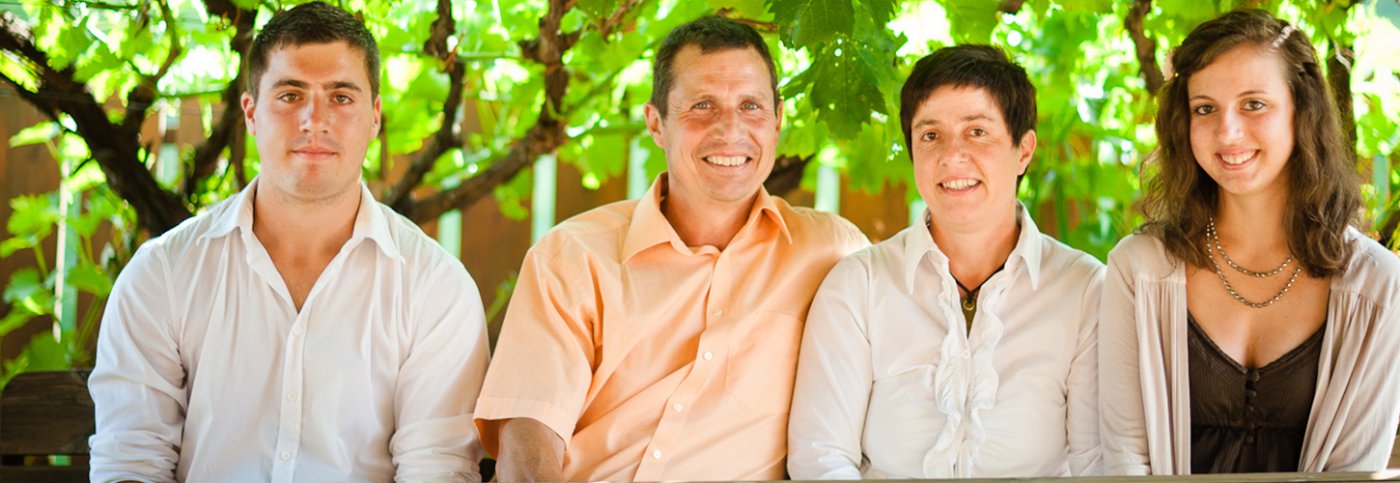 |
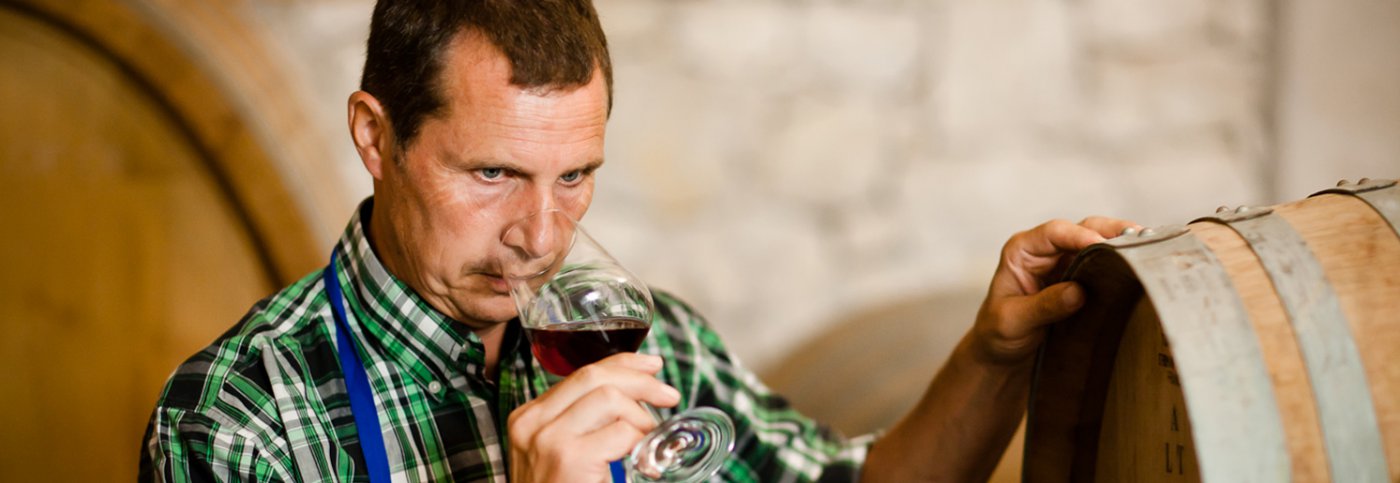 |
At the beginning of the millennium, Helga and Thomas Unterhofer first produced a little wine on the side, but when they took over the farm in 2002, viticulture soon became their sole source of income. In the first three years they still sold the grapes, but in the back of the young farmer's mind, winemaking was already fixed. And so, in 2006, they decided to process the grapes themselves. In training courses and through consultations, they acquired the knowledge about wine production, and their wines received very good ratings in the relevant wine guides after only a short time. Above all, the extremely good price-performance ratio of their wines was and is rightly praised everywhere. The vineyards of the winery are situated in relatively high locations in Oberplanitzing as well as along the wine route in Kaltern and in Kampen near Bolzano. Accordingly, the wines are characterised by freshness and elegance. "This is a great advantage for us, as it allows the varietal character to come into its own well, and I attach great importance to this in all our wines," says Thomas Unterrhofer.
The range of white wines currently consists of Pinot Blanc, Sauvignon, Chardonnay and Kerner, all of which are vinified as single varietals, as well as the Chardonnay/Sauvignon cuvée 'Reitl', which also contains small amounts of the fungus-resistant Bronner variety. The Sauvignon Blanc selection 'Maxime' was produced in 2009. After fermentation and one year of maturation in large acacia wood, this wine was stored in the bottle for four years and shows that even older vintages can experience an interesting development. Great importance is also attached to elegance and fruit freshness in the red wines. The Vernatsch 'Campenn' is already predestined for this due to its origin. The vines are planted at an altitude of 600 metres in Campenn near Bolzano with high temperature differences between day and night, which promotes acidity and the complexity of the aromas. In the case of Sankt Magdalener, a greater concentration of fruit is achieved by using several varieties of old Vernatsch vines and slightly drying some of the grapes. "However, the most important thing for us with this wine is also elegance and drinkability." The same applies to the Merlot, which rounds off the range as a full-bodied red wine. Here, part of the grapes is dried after the harvest, similar to the Ripasso wines from Valpolicella. The goal is an intense wine, but one that is characterised by the juiciness and fruitiness of the grape variety. Vineyard work on the steep slopes is almost exclusively done by hand, and plant protection methods are close to nature. The motto is "as little as possible and as much as necessary. We see ourselves as caretakers of the landscape and as passionate wine producers who refine a valuable product - a pleasure food that has accompanied and helped shape the history of our country from the very beginning."
Direct sales by appointment.
Oberplanitzing 5, Kaltern
Tel: +39 0471 669 133
info@weingut-unterhofer.com
Josef Sölva has moved a lot in Kaltern. The down-to-earth 'original rock' of Kaltern - you practically never saw him without his blue apron, the traditional working clothes of South Tyrolean winegrowers - was often one of the first when it came to sensible changes in viticulture in Kaltern. When everyone else was relying mainly on the aromatic varieties Gewürztraminer and Müller-Thurgau, which are popular in Italy, he had chosen Pinot Blanc as the most important wine for his small vineyard in the high-altitude district of St. Nikolaus and produced it in a Riserva version. Nowadays, almost every winery in South Tyrol has a Pinot Blanc in its top line. And if he had to, Josef Sölva sometimes disregarded what he considered to be nonsensical regulations. In 1969, for example, he was the first to plant the Kerner variety, which at that time was not even permitted in South Tyrol. On the one hand, he was simply curious and on the other hand, he was convinced that good results could be achieved with this variety. Here, too, success proved him right. The Kerner is extremely sought after because of its quality and has now been approved as a variety. Josef Sölva was also far ahead of his time in environmental protection. As a founding member of the "International Greening Colloquium", he had been campaigning for environmentally friendly soil care since 1970.
Unfortunately, Josef Sölva died much too early in the summer of 2018. His son Dieter and, more recently, his grandson Michael are continuing his work in his spirit, combining tradition with sensible innovations and with what gives them pleasure. And in doing so, they make no compromises. When Michael Sölva, during his viticulture studies in Auer, asked his father for some grapes he didn't need so that he could make his own wine according to his ideas, his father said "you don't get my leftover grapes, you get my best grapes." The result is a wine unlike any other in Kaltern to date: 20% of the grapes were fermented as whole clusters, 80% as crushed grapes in an open wooden vat on the skins and then aged in a used oak barrel. As the name suggests, this wine was fermented spontaneously, processed without the addition of sulphur and bottled without fining or filtration. The 'Without' presents itself completely unique, clearly spicy, tart and at the same time very juicy in the mouth, with herbal and vegetal notes, lively acidity and lots of grip. All the other white wines of the winery are also very distinctive wines, which are always vinified extremely dry. Due to the relatively high altitudes, they are endowed with good acidity and, despite their fullness of aroma, have finesse and bite as well as good ageing potential.
Even with the classic Kalterersee, the Sölvas were among the first to produce quality instead of mass, and they didn't care much about what was in vogue at the time. Even at a time when dark colour was important in red wine, they produced a very fine, light-coloured Kalterersee. With self-confidence and their characteristic carefreeness, optimism and confidence that what is really good will ultimately prevail, the Sölvas have also found enough satisfied customers for this delicate, likeable wine. The Weissburgunder Riserva 'Klaser' and the Lagrein/Cabernet Riserva Klaser are the winery's top growths. With these two wines, the Sölvas are now firmly established in the South Tyrolean upper league and receive top ratings in the relevant wine guides every year.
At the Niklas winery, you can spend your holidays in spacious flats and enjoy the unique view of Lake Caldaro and the uncomplicated cordiality of the Sölva family.
Direct sales by appointment:
Brunnenweg 31, Kaltern/District of Sankt Nikolaus.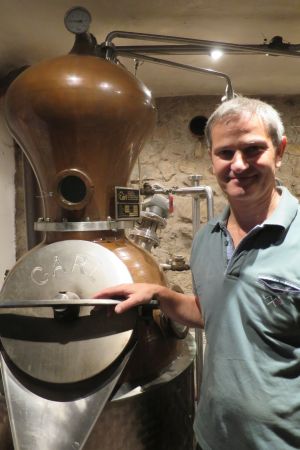 |
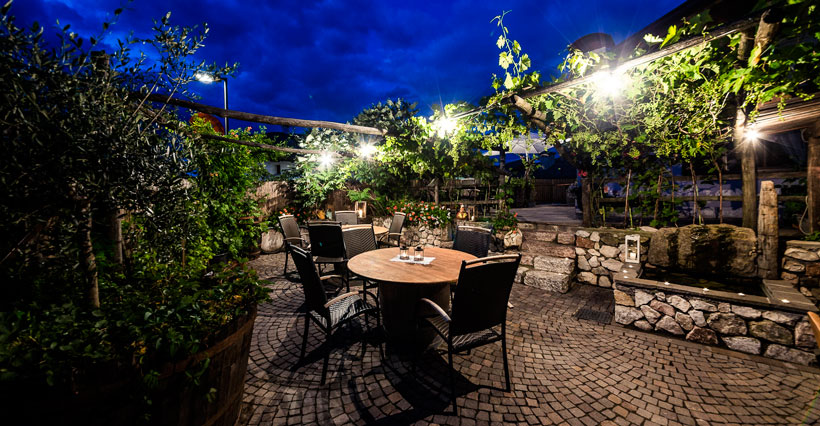 |
Hermann Luggin decided to convert to organic in 2000. At that time, he was a member of the Kaltern winery, which, unlike today, did not yet have an organic line in its assortment, so Hermann Luggin's organic grapes disappeared into a pot along with the conventional ones. Other buyers were also few and far between in South Tyrol at the time. If he wanted to use the special organic quality of his grapes for himself, he had to make wine from them himself. Another reason for marketing his wines himself was that Hermann Luggin started using fungus-resistant varieties very early on, and they were not even a niche product back then. Self-marketing is to be taken literally at the Steffelehof. The wines are only available here or when Hermann Luggin sets up a stall at one of the regional farmers' markets. And there is not only wine here, but also fruit from the farm's own orchards. As with the marc from his wines, Hermann Luggin distils his own brandies from the fruit he does not sell. All products are sold on site in the farm shop and in the Buschenschank.
In the meantime, Hermann Luggin has switched completely to fungus-resistant varieties, because he is fully convinced of their quality. "Some time ago, the qualities of these varieties were not what you would expect as a demanding wine drinker - especially with red wine. But that has changed in the meantime, so that I see no reason to go to the unnecessary trouble of spraying them and contaminating my soils with copper in the process. And I have - except when hail is announced - no more stress listening to the weather forecast and more time for my customers in the farm shop and the Buschenschank." In the vineyard, the focus is on ecology, while in the wine tavern they remain true to South Tyrolean tradition. The small but well-stocked menu includes only what has been on the menu in the Genussland Südtirol for generations - and at very reasonable prices and in a pleasant atmosphere, so that Hermann Luggin and his family don't have to worry about sales of their products.
The Buschenschank is open in July and August from Sunday to Wednesday from 5 pm.
The farm shop is open from Thursday to Sunday - always from 5 pm or on request and prior notice by telephone (Tel: +39 0471 963 608).
Steffelehof - Luggin family
Heppenheimerstr. 11
I - 39052 Kaltern on the lake
Tel: +39 0471 963 608
info@luggin-steffelehof.com
www.luggin-steffelehof.com
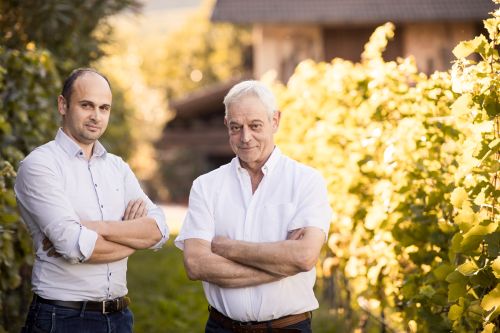 |
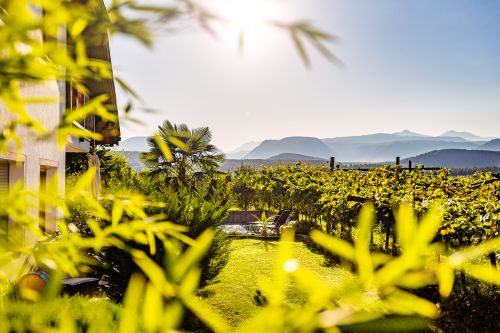 |
The first Kalterersee I ever tasted was Roland Rohregger's - 34 years ago, at a time when quality in Kaltern was still at a low ebb. It was a delicate, very fine Kalterersee, which, unlike almost all the others on offer at the time, had clarity and a certain substance. What distinguished the wine, apart from its fineness, was that it was an honest wine, produced without cellar aids. "That was not enough for many people at that time. At that time, most people were used to a lot of help in the cellar." So in the beginning it was not easy to find customers who appreciated the unadulterated taste of the Prälatenhof wines. Roland Rohregger did not let this put him off and developed his wines - not only the Kalterersee - as he saw fit. This perseverance has paid off. Now that quality has been in demand for some time, many wine lovers have become aware of the wines of the Prälatenhof. And their quality will get an additional boost in the next few years. Not only does son Stephan continue to run the business, but in 2018 the Rohregger family also succeeded in acquiring a relatively large vineyard in the South Tyrolean lowlands near Graun in Kurtatsch, and that is - even if you have to pay a lot for it - "something like winning the lottery in South Tyrol", says Stephan Rohregger. Because with these new sites, which due to their altitude of up to 800 metres and their loamy limestone gravel soils are particularly well suited for fine, elegant Pinot Blancs, juicy and pithy Sauvignon Blancs and elegant Pinot Noirs, every variety can now be grown in the optimal location for it. One can certainly expect great things here, because not only the new sites are top, but also the cellar master Stephan Rohregger. He has been the cellar master of the Tiefenbrunner Winery for a good twelve years now and has impressively demonstrated his skills during this time.
In the future, the range will consist of classic Kalterersee, Cabernet Sauvignon, Pinot Grigio from the vineyards in Kaltern, as well as Pinot Blanc and Pinot Noir from Kurtatsch. In the case of Sauvignon Blanc, grapes from both vineyards will be used to obtain a wine that combines the racy elegance of the high vineyards with the intensity and fullness of the lower vineyards. Everything will be in the upper quality segment.
Guests can choose from four comfortably furnished holiday flats, a beautiful garden with a wonderful view of the south of South Tyrol, and a swimming pool with salt water. All this is only a 15-minute walk from the village centre of Kaltern.
Direct sales by appointment.
Unterplanitzing 15a
39052 Kaltern a.d.Weinstrasse
Tel: +39 0471 962541
info@praelatenhof.it weingut@praelatenhof.it www.praelatenhof.it
The wines of the Prälatenhof in the wine reviews
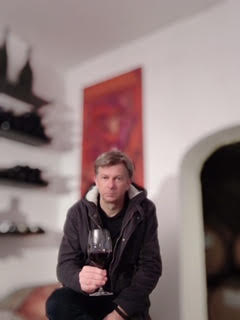 |
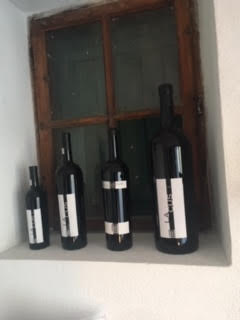 |
One man, one wine, one winery. Walter Schullian does not produce much wine. He produces an average of 2,000 bottles plus 300 magnums per year. As a sought-after viticultural consultant in South Tyrol and Trentino, Walter Schullian does not have to earn his income by selling wine and can realise his ideas about wine on his small vineyard relatively independently of economic constraints. In addition to the grapes of his South Tyrolean homeland, his great love is Bordeaux wines.
For this reason, and because the warm location and the clayey soils mixed with chalky gravel of his vineyard south of Lake Kaltern are particularly suitable for Cabernet and Merlot, he replaced the Vernatsch vines there with Bordeaux varieties in 2001, even though autochthonous varieties like Lagrein were more in vogue at the time. His goal, however, is not a Bordeaux copy, but "an independent wine with South Tyrolean character, in which you can feel both the warmth of the south and the alpine freshness of Italy's northernmost growing region." To this end, he harvests the two varieties at the same time, even though they have different ripening times. Cabernet Franc sets the pace. "It has to be fully ripe, because a wine with vegetal, green notes will never be a great wine. The Merlot is then usually a little overripe and gives the wine its own full-bodied, soft character," says Walter Schullian.
The 'Lacus' (the name is derived from the Latin word for lake) is therefore a wine "that is pleasant to drink at a young age, but at the same time has the potential to mature for 10 to 15 years." Walter Schullian has not had his farm certified organic. He does not use herbicides in the vineyard; copper and sulphur are used when there is a risk of fungal attack. In the cellar, the wine is fermented spontaneously and then matures mostly in used barrique barrels. No fining or filtration is used at all. Since Walter Schullian is on the road a lot, there are no fixed times for direct sales at the farm, but he is always happy "if someone finds their way to me even without a forest of signs - after announcing it by phone - where there is also always a reserve bottle ready for private customers."
A list of dealers can be found on the homepage.
Kaltererhöhe 4
39052 Kaltern on the lake
Tel: +39 335 5282 111
ws@lacus-wine.com
www.lacus-wine.com
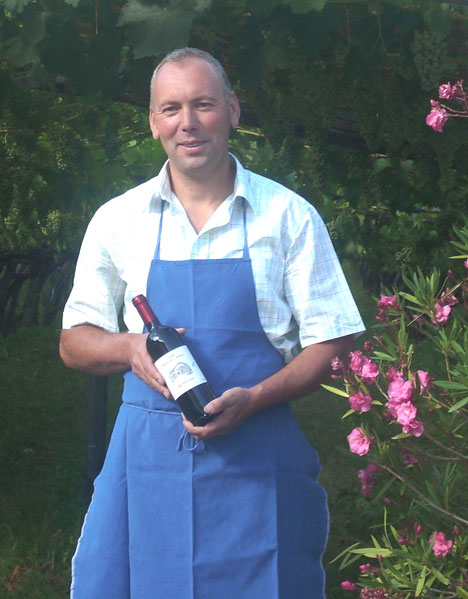 |
Markus Seppi is not a man of big words - he lets his wines speak for themselves and they speak a clear and unambiguous language, namely that of traditional Kaltern. They are genuine classics from South Tyrol's best-known wine village: delicate, elegant Vernatsch wines; dark-fruited Lagrein; soft, elegant Chardonnay; aromatic, slightly sweet Muscat. There are no more varieties, because Markus Seppi likes to limit himself to the essentials and tries to do what he does really well. With success. He is particularly fond of Vernatsch, which is why there are different versions of it: the classic Kalterersee and the 'simple' Vernatsch. The former is made from more concentrated grapes and therefore has a little more substance and a darker colour. The latter, however, is in no way inferior to its 'big brother' with its delicately fruity character. This is also how Markus Seppi sees it, for whom both wines have equal status, which is also reflected in the fact that he has equipped the 'simpler' Vernatsch with a beautiful label - a watercolour of Lake Kaltern with the vineyards surrounding it.
Markus Seppi also has a distilling licence and distils two single-varietal grappas from the marcs of his wines - a powerful Lagrein and a finely aromatic Muscat grappa, as well as a cuvée from the other varieties. All consistently dry and - like his wines - without anything superfluous.
In 2014, four holiday flats were furnished in the house according to building biology criteria. Due to the location of the Oberpreyhof, they offer a magnificent view of the village of Kaltern as well as Lake Kaltern and the surrounding mountains.
Direct sales by telephone booking:
Garnellenweg 2, Kaltern
Tel: 0471-962216
info@oberpreyhof.it
www.oberpreyhof.it
To really understand Manincor, you have to go to the estate's vineyards. Here you can experience what is important to the owners as well as to Helmuth Zozin, who has been responsible for the estate since 2008: a harmonious environment consisting of living soil and a varied fauna. Besides chickens and bees, there are also sheep. "The sheep," says Count Michael, "provide natural fertilisation, keep the grass low and bring the animal soul to the vineyard. There will also be cows again one day." But it's not just about the practical benefits. "Where there are animals, there is simply a more lively atmosphere" says Helmuth Zozin. "And just like everything else - the nearby Montiggl forest, Lake Kaltern - they contribute to a harmonious whole. There are no patent recipes in biodynamics." Some colleagues who are amazed at the effectiveness of biodynamic methods often ask him if he can tell them a recipe or two. "But it isn't. You always have to keep the whole picture in mind and ensure a positive environment that promotes qualitative growth. Only within this framework do the biodynamic remedies then work. "Biodynamics requires people to dedicate themselves to their work with full awareness. It is about closed natural cycles." For example, when oaks are fetched for the wine barrels from the estate's own forest near the Leuchtenburg on Lake Kaltern, and the wood waste is processed into wood chips for heating, or when compost is produced from the estate's own marc.
Manincor owns 50 hectares of vineyards, which naturally produces a not inconsiderable amount of wine. 300,000 bottles are produced in normal years, divided into 16 labels. The range is divided into three lines. Hand', 'Herz' and 'Krone', which differ in quality and consequently in price, but they all have the same importance for the farm. The 'Hand' wines are classic, solid, immediately accessible wines. The growths of the 'Herz' line come from the great vineyard sites of the winery in Terlan and in Kaltern. These wines combine power and elegance and are intended to "show the courage, determination and stout-heartedness of our work. With them, you should clearly see every year what Manincor stands for." The wines of the Krone line are created through extreme selection from old vines in the best vineyards of the winery and are only produced in vintages in which everything fits together.
Regardless of the respective selection line, the Manincor wines are all extremely exciting, multi-layered and very individual wines in which great value is placed on refinement and elegance. You won't find any superficial powerhouses among the Manincor wines.
Direct sales: Monday - Friday: 9.30 - 12.30 and 13.30 - 18.00,
Saturday: 10.00 - 17.00 hrs;
St. Josef on the lake 4, Kaltern
Tel: +39 0471-960230
info@manincor.com
www.manincor.com
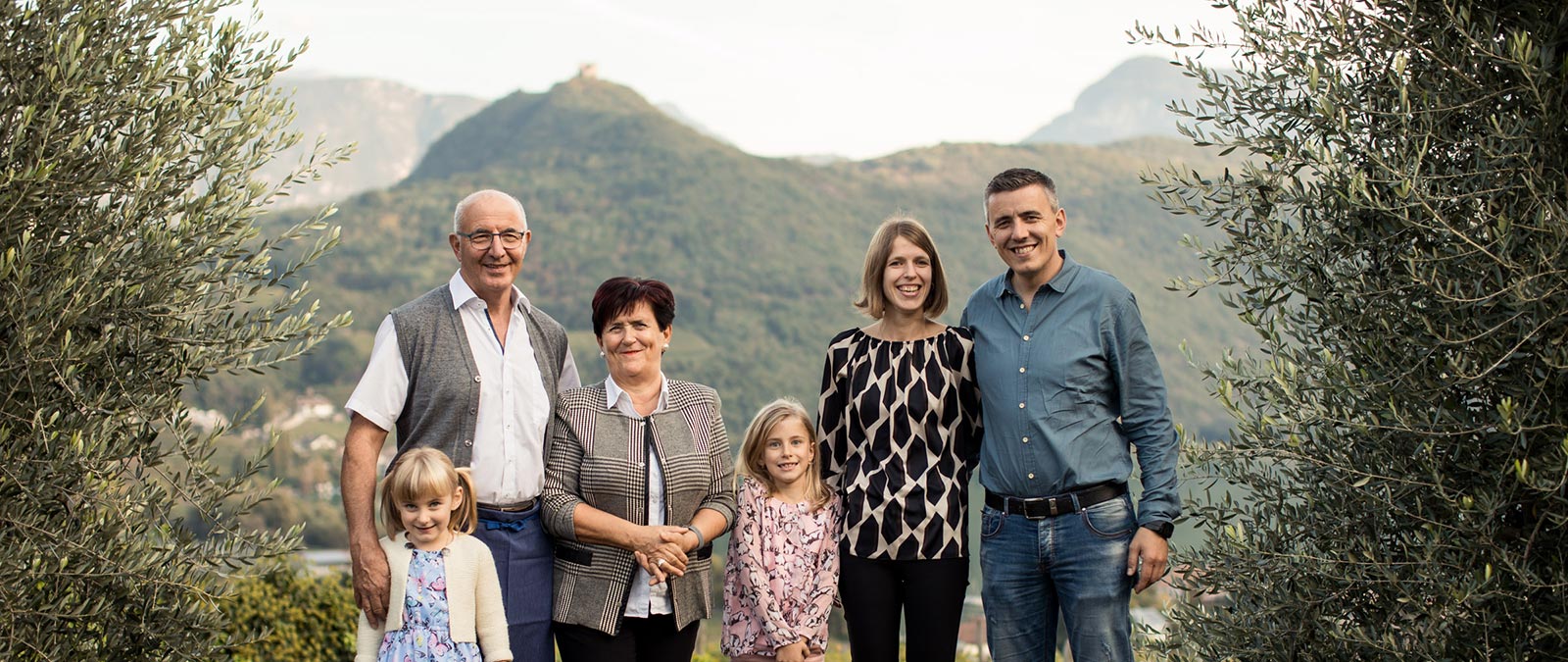 |
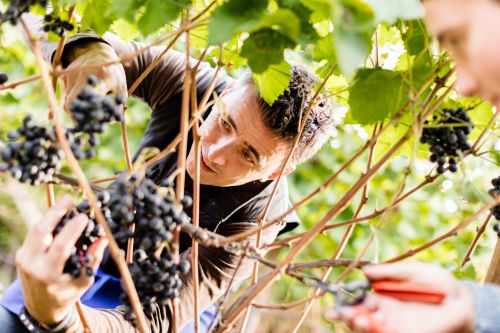 |
The names of the wines show what matters most to Arthur Rainer: "waschecht", "Feuer und Flamme", "Leidenschaft" as well as "echt geil", "Seitensprung", "Rotlicht": it's all about the sensuality associated with wine enjoyment. Certainly, Arthur Rainer has nothing against the attention associated with these somewhat provocative names, but "that wouldn't make sense if the wines then didn't deliver what you expect based on the naming." Winemaking is a "gimmick" for Arthur Rainer, which he takes very seriously. "For me, making wine is a way to live out my joy, love of life and creativity. The result must be high-quality, individual and typical wines. Otherwise, the whole thing makes no sense and, of course, no fun." For white wines, Arthur Rainer concentrates on the South Tyrolean flagship varieties Pinot Blanc, Sauvignon and Gewürztraminer; for red wines, there is a cuvée of Cabernet and Merlot and, of course, the local hero Kalterersee. The grapes come exclusively from the three family-owned vineyards Barleit, Lavardi and Hochleiten. Without neglecting his other wines, he is particularly interested in Pinot Blanc and Vernatsch (Kalterersee) - the location directly on the lake is of course an obligation - as well as Cabernet. Arthur Rainer produces a selection of each of the first two from the best grapes. The Cabernet, which together with Merlot forms the cuvée 'Rotlicht' (red light), is a strong wine and a selection wine by nature. The range is rounded off with a light, fruity sparkling wine.
Arthur Rainer is not only a passionate winemaker. With the same enthusiasm with which he makes his own wine, he looks after the guests of the Landgasthof and the 'WeinSchmiede', a wine bar in the centre of Kaltern, which he runs together with his colleague and friend Robert Sinn from the organic wine estate 'St. Quirinus'. Here, all wines from these two producers as well as a high-quality selection of national and international top wines are offered by the glass.
St. Josef on the lake 28
39052 Kaltern on the lake
Tel: +39 0471 960 158
Fax: +39 0471 960 178
info@seeperle.com
www.seeperle.com
Opening hours Gasthof:
All year round from 7 a.m. to midnight
Day off: Monday
Vinotheque WeinSchmiede
Andreas Hofer Street 13
39052 Kaltern
Tel: +39 339 801 6691
info@weinschmiede.it
www.weinschmiede.it
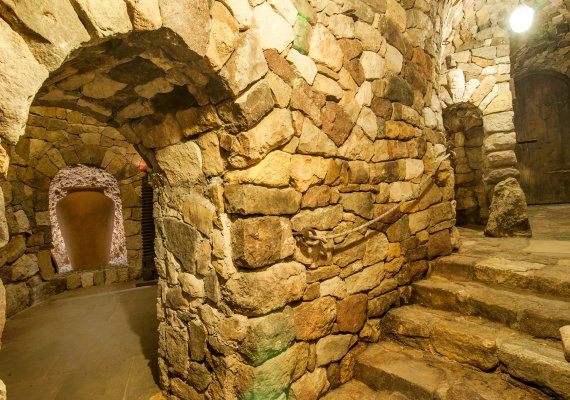 |
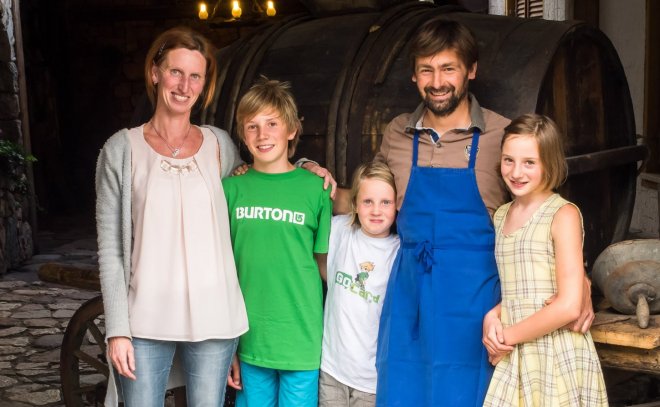 |
"It started with anger and rage and became a labour of love and passion" says Georg Morandell about his father Dominikus' life's work, the wine cellar he dug with his own hands. When Dominikus Morandell started digging his wine cellar, he was just really angry at those who were making all kinds of money selling cheap wines under the "Kalterersee" label, but paying the winegrowers less and less for the grapes. So he decided to process his grapes into his own wine and collect the proceeds from the sale himself. To do this, he needed a cellar and dug one for himself - with nothing but a shovel and a pick, because there was no money for other tools. In 1985, the cellar was ready to meet the demands of his own wine production, his wine was good and sold accordingly - and the anger had also faded in the meantime. But Dominikus Morandell had acquired a taste for wine. Not only his own wine but also digging gave him pleasure and so he simply carried on, or rather he did not 'simply' carry on, but with a new goal. He was no longer concerned with functionality, but with beauty and harmony, and so he created - still only with shovel and pick - something unique: an underground vaulted cellar with winding corridors, niches, a five-metre-high tasting cathedral with a perfectly equipped kitchen and even its own toilets. As building material, he no longer simply took whatever stones were around, but selected them for their beauty and accuracy of fit. The result was a work that no one who enters it can fail to be amazed by, and which is now even listed in the Guinness Book of Records. A stroke of fate that fundamentally changed his life forced Dominikus Morandell to abandon his life's work in 2010.
His son Georg did not expand the cellar any further, but continues his father's life's work as far as the wines are concerned. With these, Dominikus Morandell was concerned with typicality at a high level. The traditional Kalterer varieties were important to him. First and foremost the classic Kalterersee, which is why Georg Morandell dedicated his best Kalterersee to his father. The other wines are Pinot Blanc, Gewürztraminer and Lagrein, and recently a Vernatsch/Lagrein cuvée, which is vinified as a rosé. The wines are sold exclusively from the farm - at very moderate prices. You should allow a good two hours for the visit and book in on Tuesday or Friday for a tour of the Dominikus cellar with wine tasting in the 'cathedral'.
Wine sales:
Monday to Saturday from 8am to 12.30pm and from 2pm to 7pm.
Sunday from 8 to 12.30
St. Josef on the lake 39
39052 Kaltern on the lake
Tel: +39 0471 960 576
Mobile: +39 338 3636 788
info@dominikus.it
www.dominikus.it
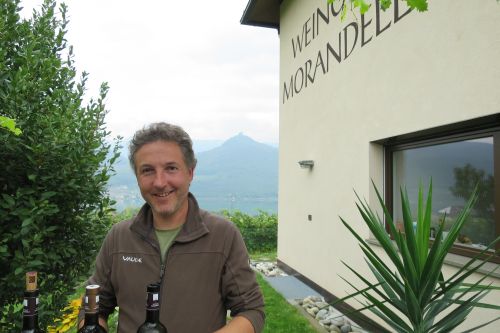 |
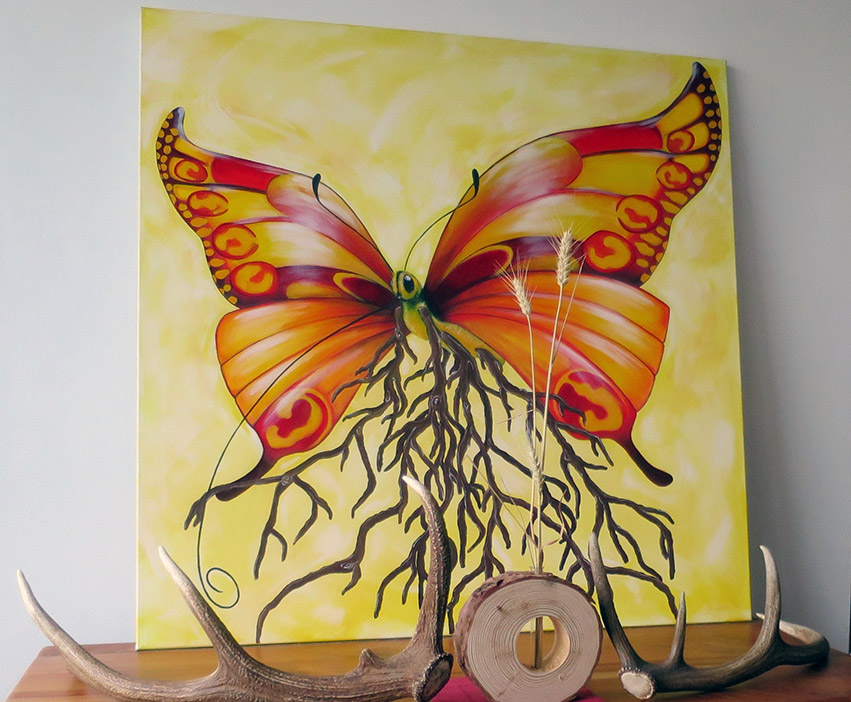 |
Armin Morandell is a trained agronomist who specialises in entomology and the importance of insects for the ecological balance in the vineyard. He has been applying this knowledge, as well as his family's many years of experience, to making his own wine since 2014. He is particularly fond of butterflies, which also belong to the insect kingdom. Butterflies symbolise the transformations that wine undergoes in the process of its creation and the kind of wines that are close to his heart. They should be elegant and multi-layered and convey carefree enjoyment of life. Four varietal wines are produced. The Pinot Grigio, whose grapes come from higher-lying sites near Kaltern village and St. Anton and are harvested relatively late, combines fruit intensity with animating freshness. The grapes for the Klassischer Kalterersee come from the Feld site above the lake. The vines are up to 80 years old and produce a smooth, complex Kalterer with a hearty character. The Merlot is grown on a south-facing site along the wine road coming from Kaltern towards Kalterersee. The grapes for the Cabernet Riserva grow directly at the estate on Kalterersee. With the Merlot, Armin Morandell attaches particular importance to fine fruit freshness. The Cabernet is matured in barriques and has a stronger character as well as a good storage capacity. The winery is not a certified organic farm, but herbicides have never been used in the vineyards; organic material is only used selectively as needed and legumes are introduced between the rows of vines as undergrowth. "I like to go back to the old methods when there were no chemicals and the farmers used their sense of observation to find out what the plants and the soil need at certain times. Unfortunately, for all the work that mechanisation has made easier, contact with the plant and the soil has often been lost. When you're sitting on the tractor, it's hard to feel the pulse of the vine - and that's essential for me. Of course, you can only do that if the farm is rather small." The farm size of 2.5 hectares will remain the same in the future.
St. Josef on the lake 34/A
39052 Kaltern on the lake
Tel: +39 0471 960 072
Mobile: +39 328 0638 920
info@weingutmorandell.com
www.weingutmorandell.com
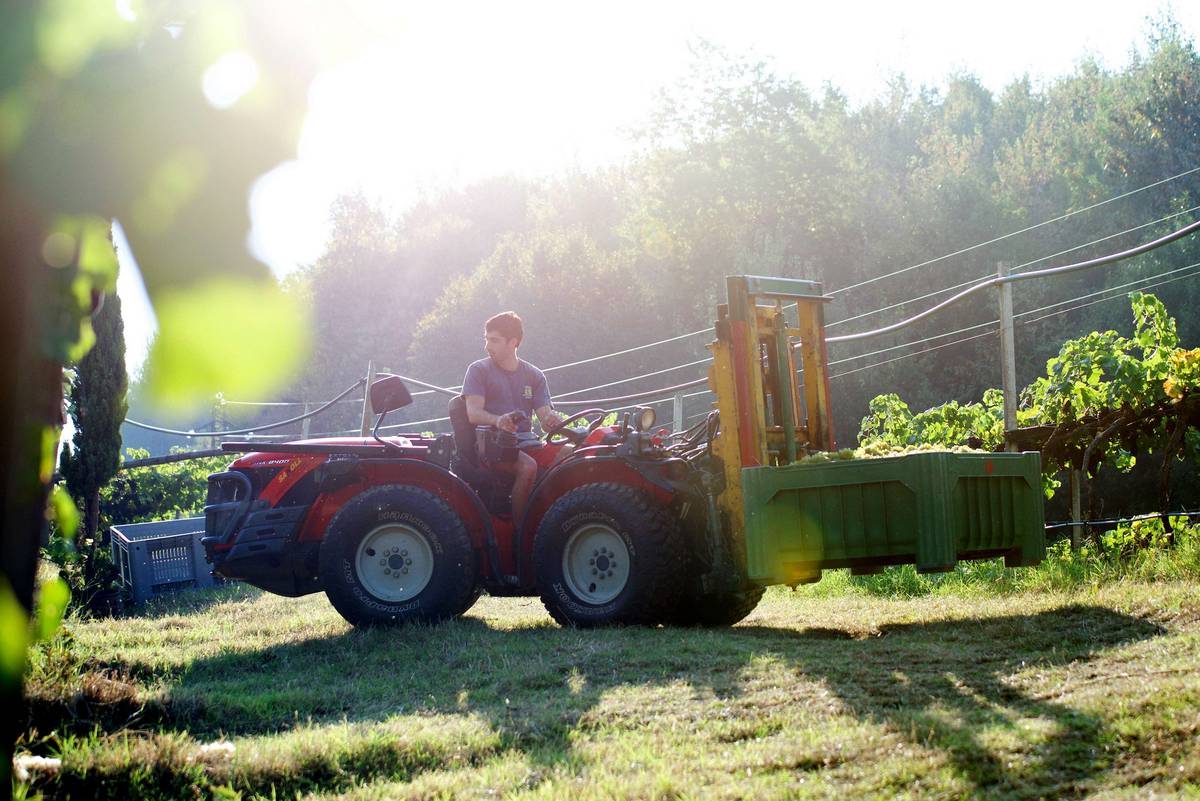 |
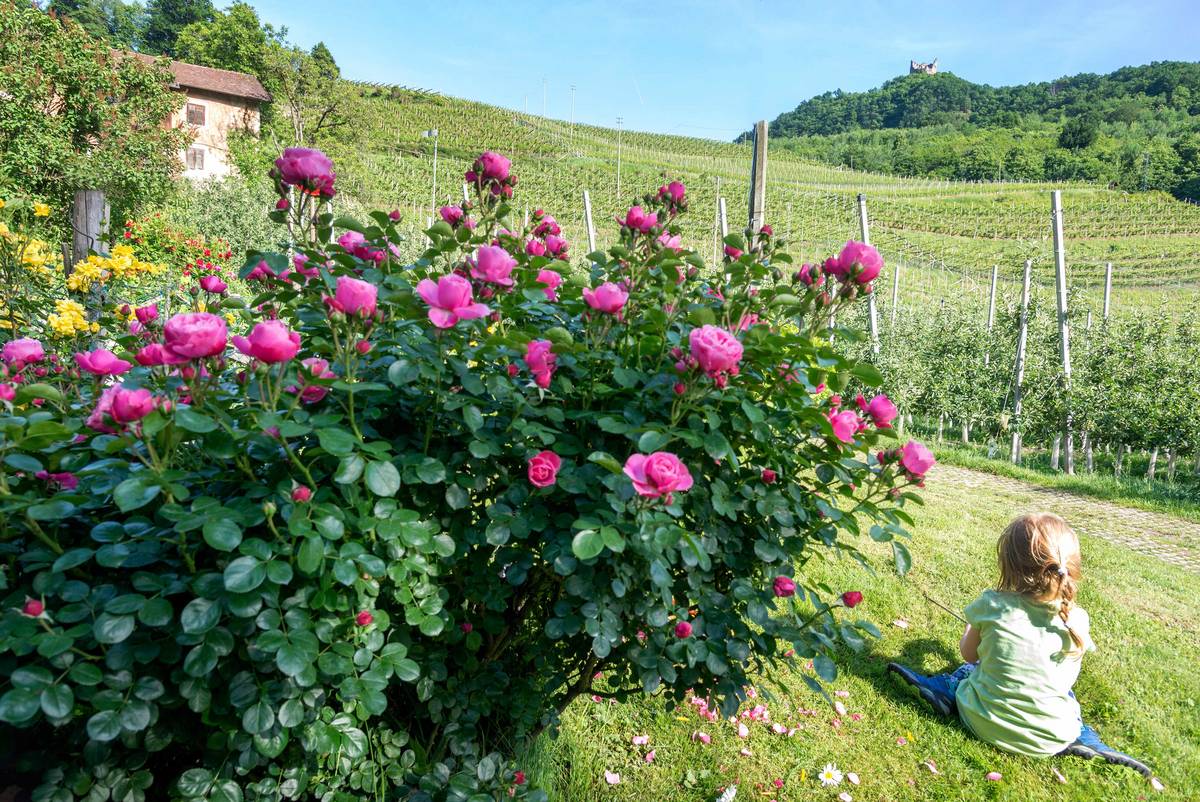 |
Kalterer See 2017 'Alexander', Gewürztraminer 1990 'Stephanie', Pinot Blanc 1957 'Verena', Merlot/Cabernet Fran-Cuvèe 1950 'Georg', Sauvignon 1917 'Karolina', Lagrein 1912 'Sepp' - these are the names of Jakob Nicolussi-Leck's wines. However, they are not ripe vintages from the winery's rarity cellar. The winery would also be far too young for such treasures, as it was only founded in its current form in 2017 and the first wines were bottled in the same year. They are the names of Jakob Nicolussi-Leck's ancestors (with the exception of the 2017 and the 1990 of course - these wines are dedicated to his son Alexander and his wife Stephanie). By naming his wines in this way, Jakob Nicolussi-Leck would like to pay tribute to those who built up and looked after the Kreithof he now runs below the Leuchtenburg castle ruins, thus enabling him to do what has always been close to his heart: produce his own wine.
This appreciation for the work of his ancestors permeates the entire work of the young winemaker from Caldaro. The cellar, which was to be completely rebuilt and equipped with the latest technology, was not simply designed as a functional new building, but was partly integrated underground into the slope as well as into the farm building of the estate, which dates back to the 13th century. Anyone who has ever renovated an estate of this age knows what that means: a lot of work and a lot of money - in the end, in any case, always more than one originally thought. Jakob Nicolussi-Leck has carried out many - actually most - of these works himself, and in the process he "almost developed something like an addiction. Because every time you uncover something, you're confronted with the simple beauty of these historic buildings and with its history, and you just have to keep going." It has paid off - though not necessarily in a strictly financial sense. The barrique cellar and tasting room in the old 13th-century courtyard building has now been completed and, for Jakob Nicolussi-Leck, is "the highlight" of the farm. The entire property presents itself as a successful combination of old and new and radiates a pleasant tranquillity due to its location on the edge of the forest above Lake Kaltern.
Inside the cellar, everything is state-of-the-art, because "my goal is fine, elegant wines with clear fruit, and for that I need optimal control. Not to steer the wines in a certain direction, but so that they can express what our sites give the grapes. We have a climate here that combines Mediterranean and Alpine influences. I want to find that again in my wines." In any case, he has already succeeded very well with his 2017 premium vintage. These are wines with intense, warm fruit and a pleasantly fresh character. The best way to get to know the wines of this young winery is certainly a holiday on site. Nine completely renovated rooms with breakfast are available for this purpose. Guided tastings are offered for groups of 15 or more.
KREITHOF. GARNI BnB Bed and Breakfast in Kaltern
weingut@nicolussileck.it
Tel: +39 338 296 37 93
info@kreithof.it
Tel:+39 0471 96 00 25
I - 39052 Kaltern am See, Kreith 2
www.kreithof.it